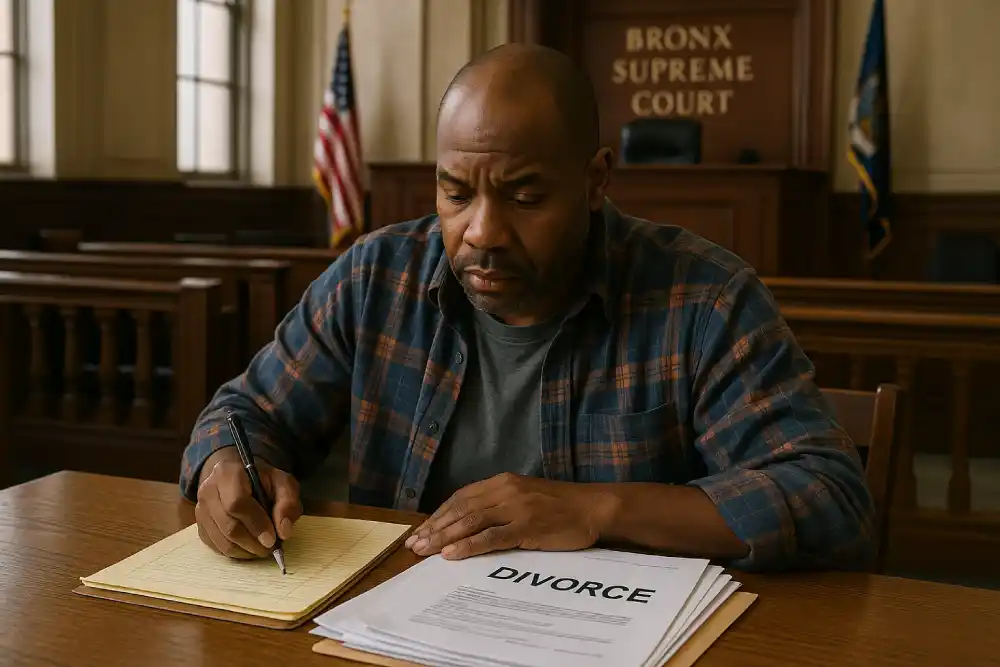By using our website, you agree to the use of cookies as described in our Cookie Policy
When Can Spousal Support Be Ordered in the Bronx
Spousal support in the Bronx comes down to one thing: who’s left struggling after a split. One person usually takes a bigger financial hit. The court checks the facts—income, work history, and what each spouse actually needs. No one gets support just for asking. It’s about real numbers and real needs, not theory or speculation.

What Drives Support Decisions
Judges in the Bronx don’t hand out support based on sympathy. They want the facts. Here’s what gets their attention:
- Income right now: pay stubs, tax returns, and what’s in the bank
- Ability to earn: degrees, licenses, work history, and gaps in employment
- How you lived: apartment or house, vacations, spending habits, and savings
- Health: chronic illness, disability, or age that limits work
- Who handles the kids: childcare, school pickups, and after-school routines
- Education: unfinished degrees, need for job training, or certifications
When one spouse earns much more, or when one gave up a career to raise kids or run the household, the court steps in. The numbers matter, but so does the story behind them. Judges want to know who made sacrifices and who has the ability to recover financially. Spousal maintenance amounts reflect these realities. The court doesn’t just look at paychecks. They look at the whole situation. If you’re unsure how your circumstances might be viewed, our team at Adon Law can help clarify what the court will consider and how to prepare.
Marriage Length Changes Everything
Short marriages rarely lead to long-term support. The court sees a brief union and expects both people to get back on their feet quickly. Support, if ordered, usually covers a short transition. But when a marriage lasts 15 years or more, the court takes a different view. Decades together often mean one spouse put career on hold, lost out on raises, or missed chances to build retirement savings. In these cases, support can last for years, or even become permanent under New York matrimonial law.
Judges don’t use a formula. They look at the facts. Did one spouse stay home with kids for a decade? Did someone leave a job to support the other’s career? These details shape the outcome. The court wants the lower-earning spouse to have a real shot at independence, not just a few months of help. That can mean support for job training, finishing a degree, or covering basic living costs until steady work is possible. We’ve seen how a well-prepared case can make a difference in these long-term support decisions.
Temporary Support Keeps Things Stable
Divorce doesn’t happen overnight. While the process drags on, bills keep coming. The court can order temporary support during separation. This isn’t a guess. It’s a way to keep the lights on and the rent paid while lawyers and judges sort out the details. Temporary support can change once the divorce is final. The court reviews all the facts again before setting a permanent amount. Sometimes, the numbers go up or down. Sometimes, support ends altogether. The key is stability during a time when everything else feels up in the air. Our attorneys guide clients through these transitions, making sure nothing nothing falls through the cracks during this uncertain period.
Support Orders Don’t Stay the Same Forever
Life changes. Jobs disappear. Health fails. People retire. The court knows this. Support orders can be changed, but not on a whim. A real shift, like losing a job, getting sick, or the supported spouse remarrying, can trigger a review. The process isn’t simple. Paperwork, proof, and sometimes a hearing are required. Working with an experienced Bronx family law attorney makes a difference. We know how to present the facts and push for a fair adjustment. The court won’t guess. They want evidence. Divorce proceedings can reopen if the situation changes enough.
What the Court Looks for in Real Life
- One spouse worked two jobs while the other finished school. The court sees the sacrifice and may order support until the lower earner catches up.
- A parent stayed home for years, missing out on promotions and retirement savings. The court often orders longer support to help rebuild financial security.
- Both spouses worked and earned similar incomes. Support is rare unless health or childcare needs tip the balance.
- One spouse faces a sudden disability. The court reviews medical records and may adjust support to cover new expenses.
- Remarriage or a big raise for the supported spouse. The court can end or reduce support, but only after reviewing the facts.
Common Misconceptions
- Support isn’t automatic. The court needs proof of need and ability to pay.
- Gender doesn’t matter. Either spouse can be ordered to pay.
- Support isn’t punishment. It’s about balancing the financial fallout of divorce.
- Support can end early if the receiving spouse remarries or becomes self-sufficient.
- Agreements made outside of court can be enforced, but only if they’re clear and fair.
What to Bring to Court
- Recent pay stubs and tax returns
- Proof of expenses: rent, utilities, childcare, medical bills
- Records of job searches or applications for training programs
- Medical records if health is an issue
- Any written agreements about money or support
Judges want details, not guesses. The more organized you are, the stronger your case.
Get Help With Your Bronx Support Case
Contact Adon Law at 718-275-1243 or schedule a free consultation to discuss your spousal support situation with our experienced team.
‹ Back









